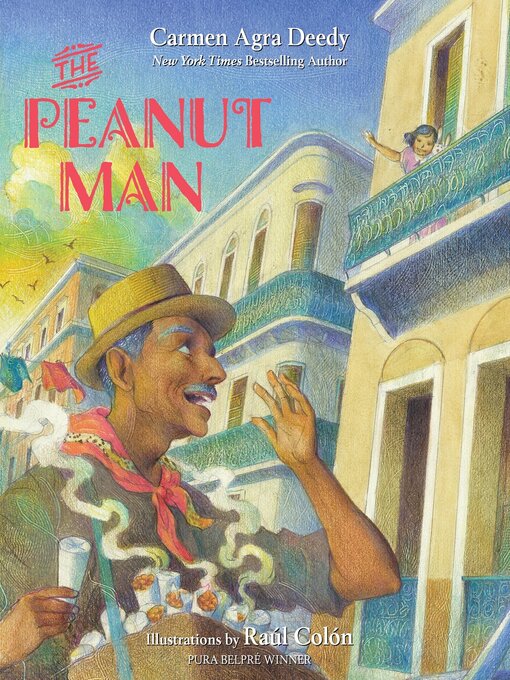The story of a Cuban refugee and her joy in an unexpected encounter that connects her beloved home in Havana with her new home in Atlanta
Each evening Coqui waits for the familiar cry of the Peanut Man—"¡Mani! Peanuts!"—and watches for him to appear on the street below her window. They always greet each other in their own special way—Coqui tucks her thumbs in her ears and sticks out her tongue at Emilio. And Emilio, to her great amusement, does the same in return. Night after night, the two friends continue their ritual.
One evening, Coqui sadly announces, "Nos vamos." She tells him that they have to leave Cuba. They are going to the United States. Emilio tries to assure her that she will like many things about los Estados Unidos, especially beisbol, her favorite sport. "But don't forget your friend Emilio," he says as he walks away. "¡Nunca!" she calls out through tears. She could never forget him.
Coqui and her family arrive in Decatur, Georgia, in the dead of winter to snow-covered ground. Her father seals the windows with duct tape and they await the arrival of spring. Coqui watches for the Peanut Man, but he does not appear.
Several years pass, she learns wobbly English, and becomes a devoted Atlanta Braves fan. She forgets her beloved Peanut Man. Then one day her father surprises her with the perfect birthday gift—two tickets for a Braves game to see their favorite player Hammerin' Hank Aaron. As they settle into their seats amid the cheering crowds, Coqui hears a man yelling "Peanuts! Get your peanuts!" The delicious smell of roasted peanuts reaches her and memories of home and Emilio rush into her head.
With luminous illustrations by the award-winning artist Raúl Colón, this story of immigration, of being displaced and finding a connection to home, reminds us how much alike we humans are, regardless of culture, color, or creed.
- Just Added eBooks
- New York Times Notable Books of 2021
- Rainbow Reads - Fiction
- Rainbow Reads - Nonfiction
- Always Available
- Black Voices
- In the Garden
- Available Now - No Hold List!
- Get Hooked!: Series Starters
- Anti-Racism and Social Justice
- Lifestyles of the Rich and the Famous
- Smart People Read Dummies® Books!
- All Titles
- See all ebooks collections
- No Wait Audiobooks!
- Just Added Audiobooks
- Black Voices
- Get Hooked!: Series Starters
- Now Available From Recorded Books!
- Anti-Racism and Social Justice
- The Outlander Series: Now On Audio!
- Listen to the Stars!
- Available now
- New audiobook additions
- All Titles
- New teen additions
- Most popular
- See all audiobooks collections
- Popular Magazines
- Cooking & Food
- Home & Garden
- Fashion
- News & Politics
- Celebrity
- Sports
- Business & Finance
- Science
- Kids & Teens
- Tech & Gaming
- Cars & Motorcycles
- Family & Parenting
- See all magazines collections



